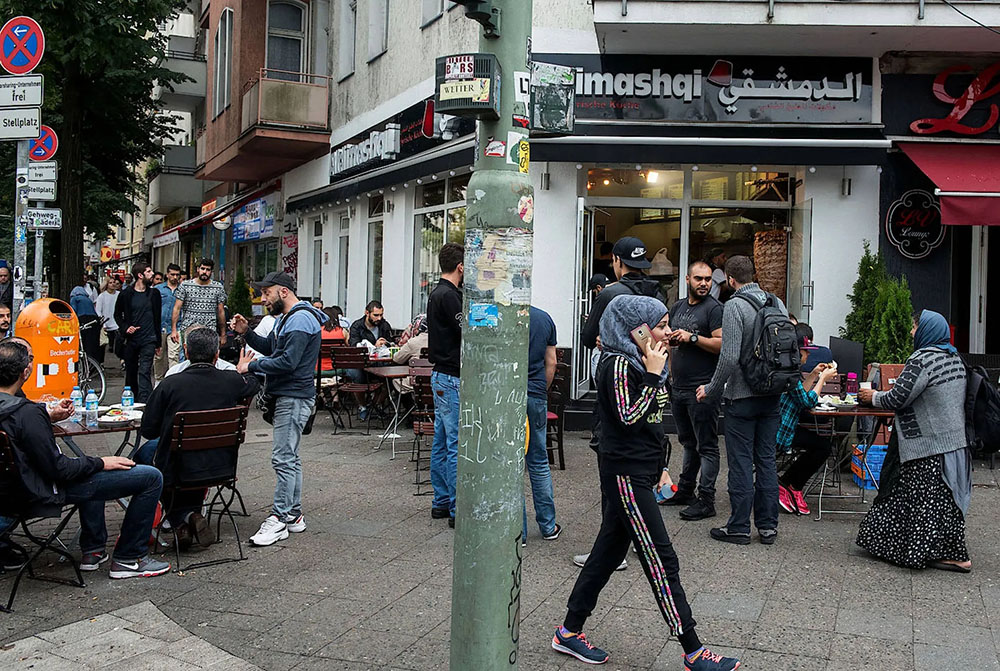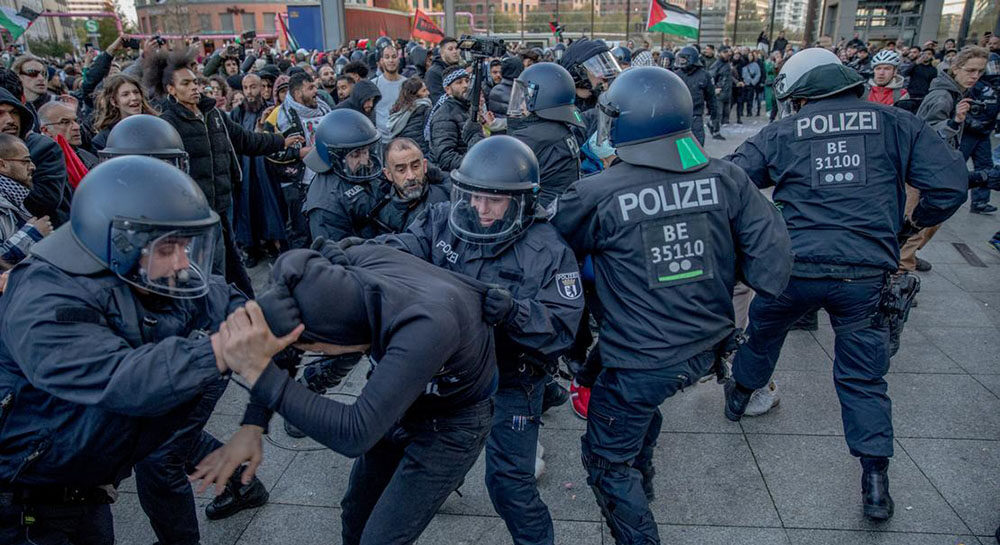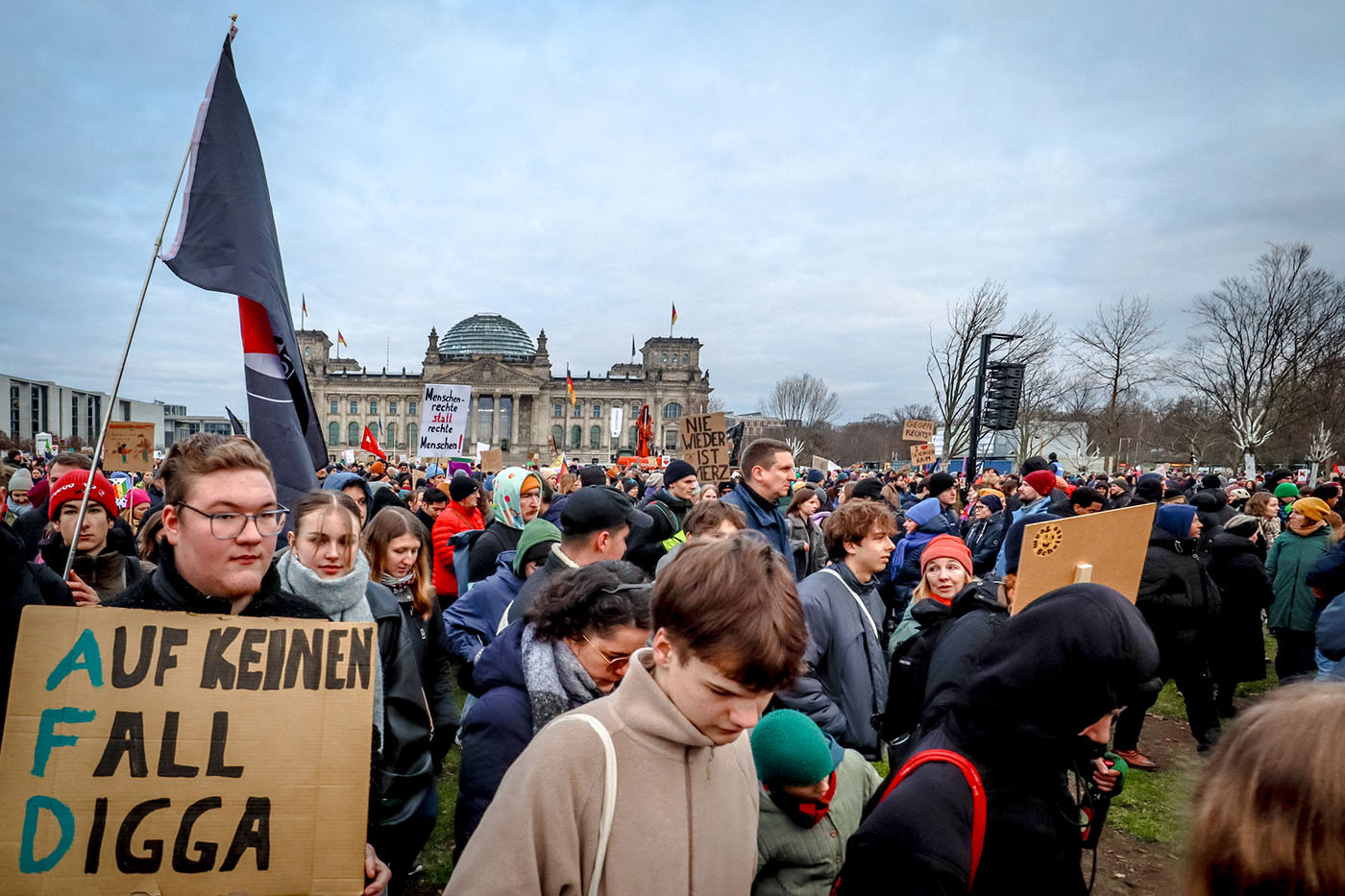February’s snap federal election formalized what many already knew: Germany is lurching right. Mainstream discourse fixates on the far-right party, the Alternative for Germany (AfD), framing the resurgence of fascism merely as a looming threat — erasing those already crushed by the state’s boot: immigrants from the global south and pro-Palestinian voices.
Laila Abdalla
A couple of weeks before election day, I visited a close friend in Hamburg. She’s Egyptian, married to a German, and has more German friends than I do. I hadn’t realized just how distant I’d become from German social culture and political discourse until that trip.
One day, we were sitting in a café with some of her German friends. The lavish vibe and comforting scent of freshly brewed coffee triggered a wave of survivor’s guilt in me. As we’re confronted with apocalyptic images on a daily basis — from Gaza, the West Bank, Beirut, southern Lebanon, Syria, and Sudan — guilt has become a constant companion for hundreds of thousands of Arab* immigrants living here. But you learn to block out the melancholy and accept the simulation of safety you live in.
I was able to quiet my mind, return to the café and listen to the Germans discussing the upcoming election. They were worried; a far-right party was on the verge of a national breakthrough. They spoke of fascism’s threat and the importance of defending democracy. All valid points. But as I listened, I felt a familiar disconnect — similar to the one I feel when I see headlines about massive “anti-fascist” protests. My eyes involuntarily roll as I wonder: Are they aware that their liberal dread exists alongside a comfort I no longer share? That the democracy they’re determined to preserve has already crumbled in my reality?
It wasn’t just my overpriced cappuccino that was bitter — I was, too. A bitterness informed by personal experiences. I think back to the time a police officer in full riot gear pushed me aggressively when I was covering a pro-Palestine demo in Berlin. I was wearing a press card, and I turned around to show it to him, saying “Why are you pushing me? You can also ask me to move” in German. He looked me dead in the eye, then pushed me again. Is that not fascism, happening in real-time under a “democratic” government?
A guy named Johannes** chimed in, pulling me back into the café conversation and away from that agitating memory. He said he could empathize, to an extent, with AfD voters — with their fear that Germany was becoming unrecognizable. “I went on a world trip in 2013,” he told me, “and let me tell you, Germany changed 180 degrees after that. There was a clear before and after.” I asked what he thought caused the shift. He didn’t even blink. “The refugee crisis. 2015, 2016. That changed everything.”
He said it without malice, even clarified that he didn’t personally feel the same as xenophobic Germans, yet he understood the distress some felt at what he called the “dramatic transformation” of the population.
I knew exactly what he was referring to: Germany’s “Willkommenskultur,” or welcome culture; when hundreds of thousands of refugees made their way into Europe in 2015, then-Chancellor Angela Merkel declared an open-door policy. As Europe’s largest economy, she saw it as Germany’s national duty, and her statement “Wir schaffen das” or “we will manage” became somewhat of a political symbol. By 2016, Germany received over a million asylum applications, most of them from Syrians fleeing the civil war.
That’s when Germany’s Arab community grew significantly, though there was a notable Arab presence in Berlin as early as the late 19th century. The first wave of post-war Arab immigrants arrived in the 1980s — Moroccans and Algerians who came during the guest-worker movement, along with Palestinian and Lebanese refugees fleeing Israeli aggression. Today, more than 1.5 million Arabs live in Germany, according to the Federal Statistical Office. The largest concentrations can be found in cities like Frankfurt, Munich, Hanover, Hamburg, and Berlin. I’m one of the Arabs in the capital, and as a person who has lived in other German cities before, I can say that the community here is much more present than anywhere else I’ve experienced. Neukölln, a neighborhood in Berlin, is now basically an Arab district. So much so that “Sonnenallee,” a street in Neukölln, is colloquially referred to as the “Arab Street”— شارع العرب —It’s where you will find the best food in Germany, products you know and love, shop signs and graffiti in your mother-tongue, a cocktail of Arabic dialects, a sense of belonging you don’t have to fight for — it’s the epicenter of the community. And more recently, the only refuge for many of us.

I thought about the Arab Street a lot when I was in Hamburg. At one point, Johannes offered another nod of sympathy to AfD voters. “They probably feel like that’s the only party that takes their concerns seriously — and I blame cancel culture,” he said. I just looked at him silently, knowing he would keep talking.
“White men can’t say anything anymore without being cancelled in liberal circles,” he went on. “Especially about foreigners and immigrants; they instantly get labeled as racists.”
I told him I see it very differently. We are talked about all the time. The entire political spectrum has shifted against us, just at different volumes. The AfD is simply the loudest. The most openly racist. For many of us — third-world immigrants, Arabs, people of color—the far right isn’t an outlier. Anti-immigrant rhetoric echoes across the entire political spectrum. Look right, look left, you will find some version of xenophobia.
Sometimes, it’s as crude as a viral video from a party on the island of Sylt, where young people danced and chanted, “Germany for Germans, foreigners out.” In the background, one person appeared to give the Hitler salute. As soon as a Nazi gesture enters the frame, politicians rush to condemn it. They perform public outrage, distance themselves from the image. “There must be no tolerance,” said then-Chancellor Olaf Scholz, commenting on the video.
The same Scholz who, just months earlier, appeared on the cover of Der Spiegel with the quote: “We must start deporting en masse.” He was referring to young, mostly Arab protesters in Berlin after October 7th.
The common thread in both moments? Scholz’s eagerness to condemn perceived antisemitism.***
In Germany, it has become second nature, a national reflex, to demonstrate that you’ve “faced up” to the Nazi past. That you’ve atoned. I once came across a term that captures this mindset with eerie precision: guilt pride. Coined by Prof. Hans-Georg Moeller, it describes the paradox of accepting responsibility for the Holocaust, but doing so from a place of moral superiority.
Guilt pride explains how, in today’s Germany, police can arrest Jews for antisemitism. How the state can routinely censor Jewish voices. Germany believes it has learned from its history so well that it’s now entitled to decide what antisemitism is — even for Jews.
But “guilt pride” doesn’t only affect the anti-Zionist Jewish voices. It’s also what compelled Friedrich Merz, the man on course to become Germany’s 10th chancellor, to say “we already have enough young antisemitic men in the country,” when asked whether Gazan refugees should be welcomed here. He made that statement while Germany was generously supplying Israel with the weapons it used to wage its war of extermination on Gaza.
You see, despite the fact that the majority of registered antisemitic offenses in 2023 were committed by German right-wing individuals, according to a report by the Federal Criminal Police Office, the narrative holds: antisemitism is no longer homegrown — it’s imported, particularly by Arab Muslims. It’s the perpetuation of that narrative by mainstream politicians and media that laid the ground for the animosity directed towards us today. I will never forget that one cartoon video published by Bavaria’s interior ministry on X last year to warn against the Islamic Salafi “trap.” It wasn’t even the blatant Islamophobia that struck me, it was the machinery behind it. Having worked in German media, I know how many eyes signed off on that video before it went live. It was pitched, approved, scripted, animated, voiced-over, edited, revised, and then uploaded. Not one person thought to stop it? Only after users compared it to Nazi-era propaganda did the ministry take it down and apologize.
From where I stand, the far-right AfD has already won. They’ve dragged the conversation so far right that “mainstream” parties now parrot their talking points in a desperate attempt to reclaim voters. In their fixation on political victory, they lost the ideological war. And fascism — which Germans still like to imagine lives only in the AfD— is an ideology before it’s a political reality.

Deportations rose by nearly 20% last year. And if you’re thinking they’re only deporting the “undocumented,” think again. Just recently, the Intercept published an investigation into four foreign nationals, three EU citizens, one American, all being targeted for deportation by the German authorities for their participation in pro- Palestinian protests. All of them are legal residents in Germany and none of them has been convicted of any crimes. It’s a blatant crackdown on political dissent, masked as a fight against antisemitism. Palestine has exposed the fault lines in Germany’s performative democracy.
Since October 7th, cultural and academic institutions across the country have cancelled countless events. Even Francesca Albanese — the UN Special Rapporteur on human rights in the Occupied Palestinian Territory — wasn’t spared from Germany’s climate of harassment and intimidation. She has been travelling the world, shedding light on Gaza from a legal lens and had a few talks scheduled in Germany. Two universities cancelled on her, and at events that did go ahead, the police maintained a heavy presence. In an article she wrote after her trip, Albanese described the reality in Germany as “dystopian.” She said she had “never felt such a sense of lacking oxygen” — and this is someone with diplomatic status and immunity. Can you imagine what happens to the rest of us, especially Arabs?
Excessive force, provocation and harassment at protests, raids on the homes of activists, arrests, fear-mongering in the media, bans of chants and entire languages at demonstrations… “a troubling shrinking landscape for freedom of expression and other fundamental rights,” as Albanese put it — all happening under a supposedly democratic government.
Let me be clear — I don’t underestimate the AfD’s venom. They are a blatant display of rotten ideologies. If they ever govern Germany, it will be worse for everyone, including us. After all, this is the party that held a “secret meeting” with neo-Nazis last year, mapping out a “master plan” for mass deportations. But when the supposed antidote to that is a government that also cracks down on me and my community, what choice do we really have? It’s like we’re living in parallel realities under the same sky. Germans march against a future they fear, while we live in a present they ignore.
I remember when I first moved to Germany in 2015. I actively distanced myself from my roots, my language, my culture. I wanted to integrate, be part of German social circles, and prove that I belonged. I even used to criticize my Egyptian friends who only hung out with other Egyptians. “What’s the point of living abroad,” I’d ask, “if you don’t step out of your bubble?” But as the years passed, and Germany grew more openly hostile, I found myself running back to that very bubble, not out of fear, but out of necessity. Out of exhaustion. Now, I spend most of my time in Neukölln, where I’m surrounded by Arabic conversations, food that tastes like home, and a kind of belonging I don’t need to earn.
This is where I feel safe. Or at least, where I feel seen.
But sitting in that café in Hamburg, listening to Germans talk about their fears for this country? It made me fantasize about going back home.
Who knows, maybe I won’t have a choice.
Notes:
* “Arab” here refers to Arabic-speaking people who share a common language and cultural history, rather than an ethnic identity. It’s used in its cultural-linguistic sense, especially in diaspora communities.
** Johannes is a pseudonym used to respect the individual’s privacy.
*** Germany defines antisemitism based on the working definition set out by the International Holocaust Remembrance Alliance (IHRA), which has been criticized for weaponizing the term “antisemitism” to dismiss legitimate criticism of the State of Israel.




